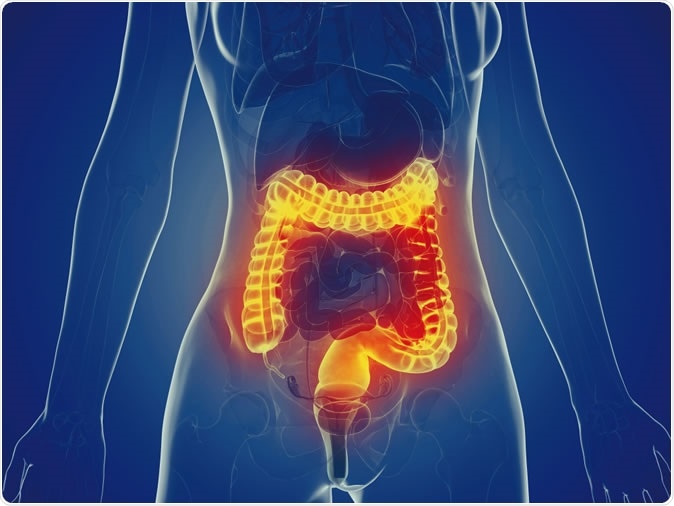There are three times as many people with the chronic and debilitating bowel disorder called inflammatory bowel disease (IBD) as ever thought before, according to a new study presented today at UEG Week 2019, at Barcelona. Not only is the condition a distressing one in itself, but patients with IBD have a higher risk of colorectal cancer as well.
What is inflammatory bowel disease?
IBD is an umbrella term for all kinds of chronic gut inflammatory conditions, including UC and CD. UC is diagnosed when there is inflammation of the large intestine and the rectum, and is limited to the mucosal layer alone. CD, on the other hand, may involve any part of the gastrointestinal tract, but is most frequently seen in the terminal part of the ileum and characteristically patchy in occurrence. The inflammation may be both extensive and deep, involving the full thickness of the bowel wall.

3d illustration of a womans large intestine - Image Credit: Sebastian Kaulitzki / Shutterstock
The problem with IBD is the long-lasting nature of the symptoms and their severity, which compromises the qualjty of life of these patients. Prior research has shown that patients with CD and UC have higher odds of depression and higher absenteeism rates at work. In fact, about 44% of people with IBD say they could not hold on to their jobs because of their condition.
IBD may have both genetic and environmental causes. More than 150 genes have been linked to this condition. In addition, the composition of the gut microbiome, which is itself richly influenced by dietary habits, is a key factor that may trigger IBD in those with the wrong genes. Or it may aggravate the progression of the condition. Bacteria and viruses may thus play a major role in this disease, and active research is going on to understand how the gut microbial environment can be specifically changed to help reduce the severity of, or even reverse, the gut inflammation that is so characteristic of it.
IBD is not a simple condition to treat, nor is the management cheap. Instead, it is a disease which does not have any current cure. As a result, treatment often continues lifelong. Researcher Dominic King says, “As there is currently no known cure for IBD, patients will often need complex and costly treatments throughout their lives. This predicted rise in prevalence may place an even greater strain on already overburdened healthcare systems. The burden of IBD is compounded further by an association with colorectal cancer. "
The study
The current research comes from the UK, where researchers looked into IBD cases recorded from 2000 onwards to accurately reflect the current incidence and trends for this disease condition. To do this, they examined all cases diagnosed as either ulcerative colitis (UC) or Crohn’s disease (CD), taking data retrieved from the The Health Improvement Network (THIN). This is a database representing UK primary health care. Using this improved level of data acquisition, the study was able to demonstrate that the number of IBD patients is three times as high as ever estimated earlier. The 2017 prevalence of UC is 55% higher, and that of CD 83% higher, than that in 2000.
In addition, the prevalence of IBD is expected to rise by about 25% in just another 7 years, by 2025. At present, about 3 million people are affected by IBD in Europe.
The study also shows that patients with CD are at a 23% higher risk of colorectal cancer, while those with UC have a 43% increase in risk, compared to controls. This means that the predicted rise in the number of IBD cases will lead to a corresponding rise in the magnitude of colorectal cancer cases as well.
The importance of the study
The study provides the earliest accurate proof of the increasing burden of IBD in Europe, which will play a key role in planning healthcare services to provide the required standard of care for these patients. The fact remains that the disease puts an enormous weight on society and on healthcare resources, as well as on patients and their caregivers, in terms of lost productivity, absenteeism from schools and workplaces, and the effort, time and other resources expended on caregiving for affected relatives.
Noted gastroenterologist Salvo Leone says, “The results of the study are alarming, particularly if we consider the fact that Crohn's disease and ulcerative colitis are lifelong diseases that can begin at a young age and have a huge impact on a patient's quality of life. The cost is enormous. We need to put all our efforts into developing effective treatment and disease management strategies that allow patients and their families to lead happier and healthier lives.”
Journal reference:
King. D et al. 2019. Incidence and Prevalence of Inflammatory Bowel Disease in the UK between 2000 and 2016 and Associated Mortality and subsequent risk of Colorectal Cancer. Presented at UEG Week October 21, 2019.